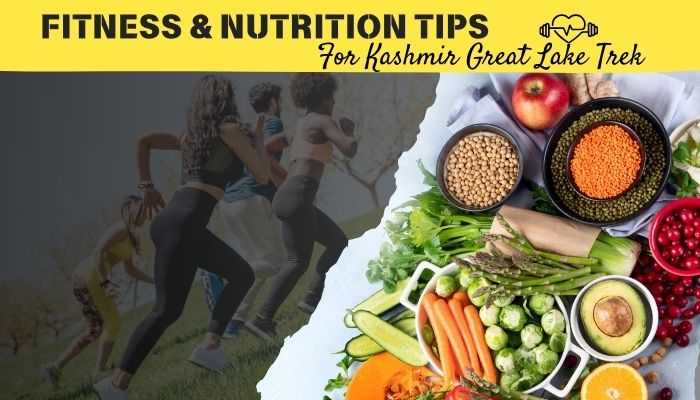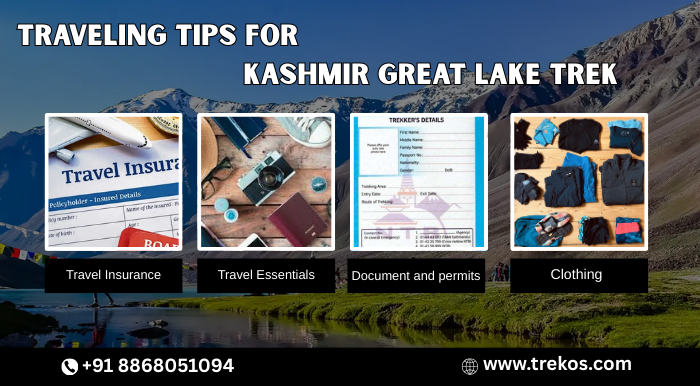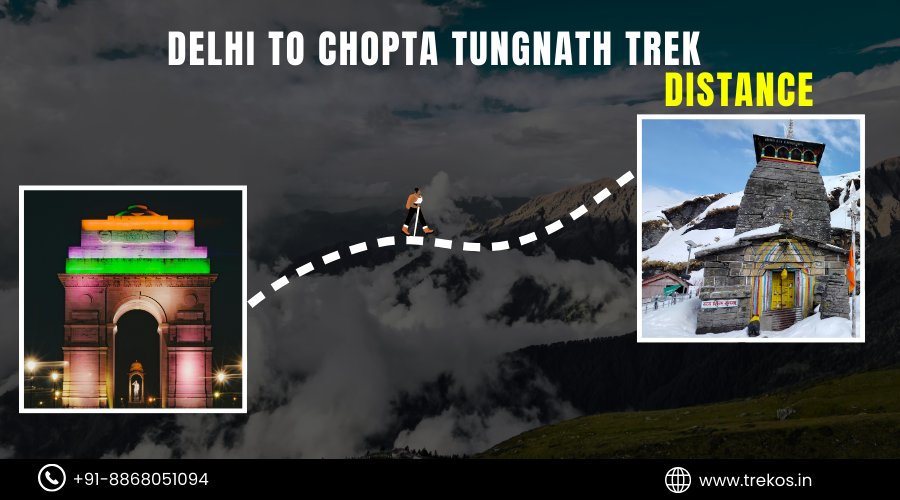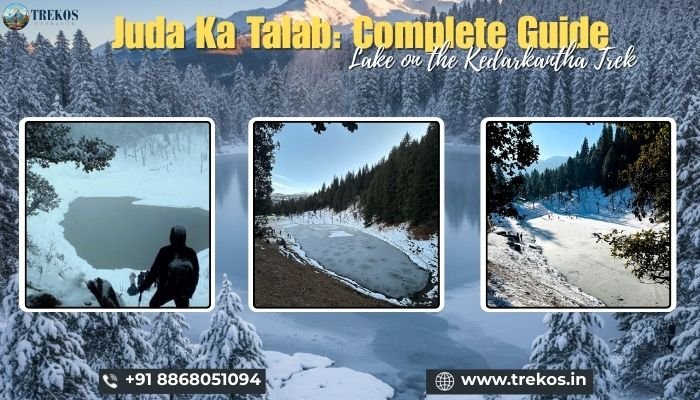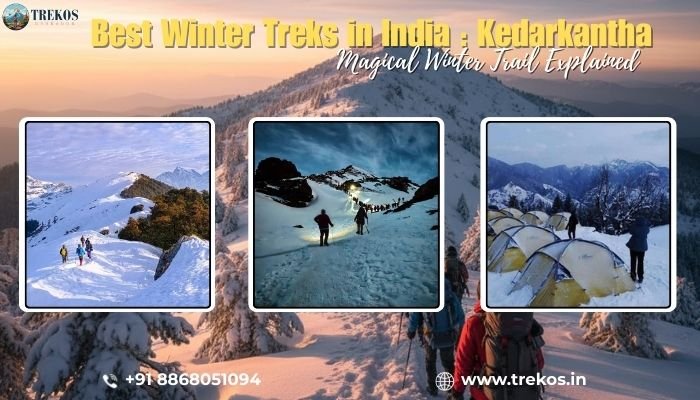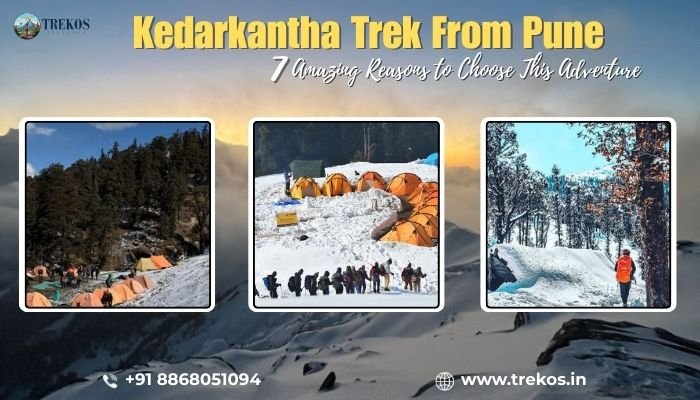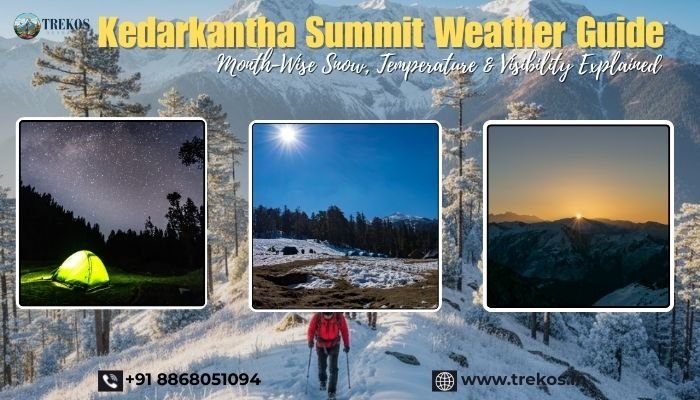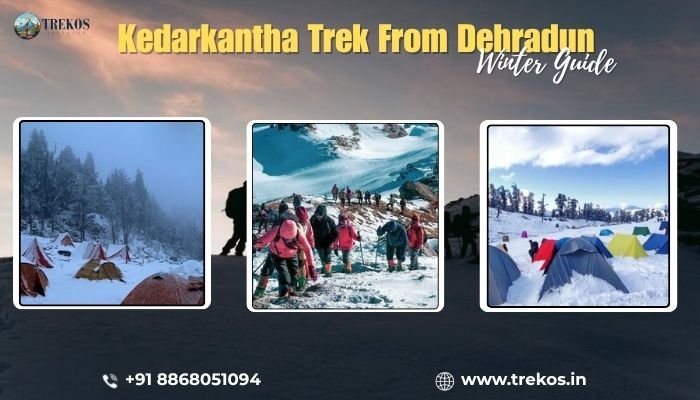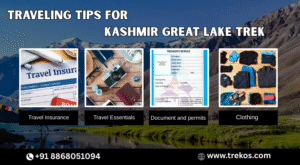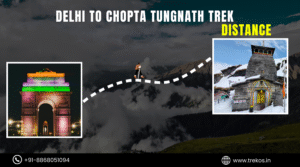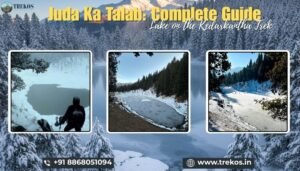Fitness and Nutrition Tips for Kashmir Great Lake Trek: Preparation Guide
One of the more picturesque and rewarding and worthwhile trekking experiences in India, the Kashmir Great Lake Trek features pristine hilly lakes, towering mountains, and vibrant meadows. Nonetheless, finishing this trek positively requires actual physical training and the right guidance. Thoughtful Fitness and Nutrition tips for Kashmir Great Lake Trek are thus necessary to any person planning to take on this challenging adventure.
The trek involves walking on rugged terrains journey high altitudes, enduring unpredictable weather, making fitness a top priority. Prior to the trek, focusing on the stamina exercise, strength training and cardio will help improve stamina and muscle strength.
Equally crucial are Fitness and Nutrition Tips for Kashmir Great Lake Trek which ensure that you fuel your body properly during the trek. A diet rich in carbohydrates, Proteins and healthy fats will provide constant energy for the long, challenging days. Hydration is also key as it help prevent altitude sickness and keeps your body functioning optimally. By following the right Fitness and Nutrition Tips for Kashmir Great Lake Trek you can fully enjoy this once in a lifelong journey through Kashmir Stunning Landscapes while Staying Strong and energized.
| Trek Information | Details |
| Starting Point | Sona Marg |
| Ending Point | Naranag |
| Total Duration | 7 days/ 6 Days |
| Highest Altitude | Gadsar Pass (13,750ft) |
| Difficulty Level | Moderate Difficult |
| Best Time to Visit | July to September |
| Average Trekking Time Per Day | 5 to 8 hours |
| Permits Requirements | Inner line Permit, ID Proof |
| Accommodation Type | Camping |
| Weather Conditions | 5 To 25C (July to September) |
| Trek Guide | Mandatory |
| Fitness Requirement | Good Physical Fitness Recommended |
| Total Trek Distance | Approx. 72Km |
Note: This Table Provides all the Key item needed to plan understanding the Kashmir Great Lake Trek in detail.
Why Fitness Matters for Kashmir Great Lake Trek
Fitness is crucial for the Kashmir Great Lake Trek as the Trek involves challenging terrains steep ascents and long walking hours at high altitude. To truly enjoy the journey and avoid any health issue following proper Fitness and Nutrition Great Lake Trek is essential. The Trek covers a distance of approximately 72Km over Seven Days with daily working time ranging from 5 to 8 hours.
Endurance is key and physical fitness play a major role in making sure your body can handle the Strain. Without adequate preparation trekker may suffer from fatigue or altitude sickness which can dampen the experience. Proper fitness and Nutrition Tips for Kashmir Great Lake Trek will help you build Stamina, Strength and resilience enabling you to tackle the trek challenge. Additional good nutrition and hydration and critical to maintaining energy levels throughout the trek. By adhering to Fitness and Nutrition Tips for Kashmir Great Lake Trek you ensure a smooth, safe, and enjoyable experience.
Cardio fitness For Trekking
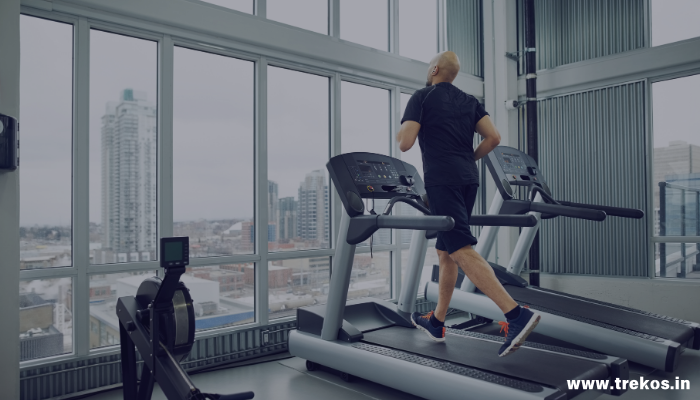
Cardio fitness is crucial for trekking especially when preparing for a challenging adventure like the Kashmir Great Lake Trek. Trekking includes long hours of constant walking. Steep ascent and descents over a rough terrain which places immense strain on your cardio system. Engaging in cardio exercise such as Running Cycling swimming or brisk walking helps improve lung capacity strength and stamina all of which are essential for successfully completing a trek at high altitudes. On the trek, especially at the Kashmir Great Lake, where oxygen levels go down, ascending would further help in accustoming your body better and hence reduce the risk of being afflicted with altitude sickness.
It is thus advisable to maintain cardio fitness 3-4 times a week with intensity increase over a period. The case of Kashmir Great Lake Trek proper fitness and nutrition have played the role so much to optimize their performance and energy levels while trekking. With a focus on cardio fitness, it not only helps in building or increasing the body’s endurance levels but also help in the enjoyment of the tremendous views and the general experience of trekking without getting too sore. All this inclusive prep does a lot to make the Kashmir Great Lake Trek such a pleasant and successful adventure.
Running
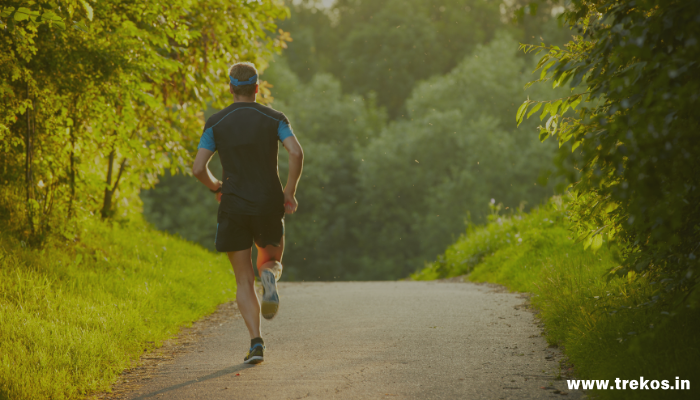
Running is one of the best sports to help build up endurance for trekking, especially when you are preparing for a tough adventure like the Kashmir Great Lake Trek. The main advantages are mainly building stamina and generally building cardiovascular endurance, attributes that can prove very important during long hours of walking through steep and rugged terrains. Regular running also has the after effects of sharpening your legs, improving lung capacity, and boosting your general fitness levels, making the strenuous sections of the Kashmir Great Lake Trek relatively manageable.
Running will also help develop mental toughness to cope with the seeming tough moments that may come along the way. However, running is part of preparation, but so are the right Fitness and Nutrition Tips for a Kashmir Great Lake Trek. An excellent diet, full of proteins, carbohydrates, and fats, is great for restoring muscle cells and, generally, provides long-term energy to perform the trek.
Proper hydration-a critical aspect discussed in the Fitness and Nutrition Tips for Kashmir Great Lake Trek is also paramount to peak performance. Running with these Fitness and Nutrition Tips for Kashmir Great Lake Treks will enhance physical readiness and the overall experience of a trek. Altogether, this makes sure that your body is even so prepared to face what the trek can present so that the journey is both enjoyable and not so taxing.
Cycling
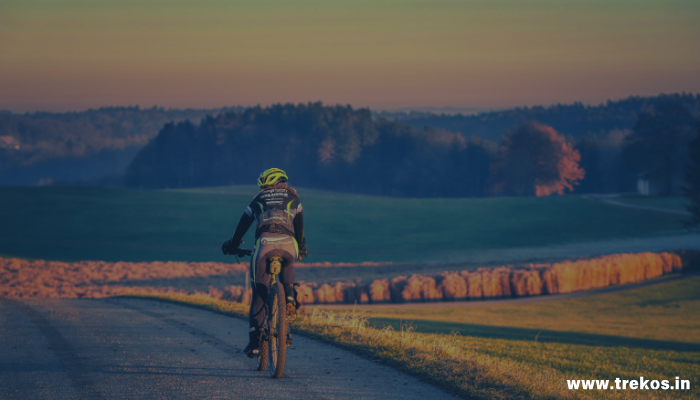
Cycling is a great exercise to help one prepare themselves for trekking. This is especially in an adventure to high altitudes, such as the Kashmir Great Lake Trek. You see, for one, you build up leg strength, endurance, and cardiovascular fitness-all requisite ingredients when trekking over very steep ascents and uneven terrains. Long cycles would target the muscles in your lower body, majorly the quadriceps, hamstrings, and calves, especially being the primary muscles engaged on long treks.
Besides, cycling develops lung capacity and stamina, helping to cope with the low oxygen levels that one would encounter during the Kashmir Great Lake Trek. Moreover, you incorporate cycling into your training program and appropriate Fitness and Nutrition Tips for Kashmir Great Lake Trek in a manner that allows you to ensure your body is prepared suitably to cope with the demands of trekking.
Good nutrition, or fuel for muscles to do work, like balancing your meals with proteins and complex carbohydrates, helps you recover better after long days of cycling or trekking. Hydration also is very important, and water intake should be regular as advised under the Fitness and Nutrition Tips for Kashmir Great Lake Trek, keeps your body going like a machine. The concerted effort between cycling, backed by good Fitness and Nutrition Tips for Kashmir Great Lake Trek, will thus enhance total endurance and make the trek much smoother and more comfortable overall.
Leg Strength
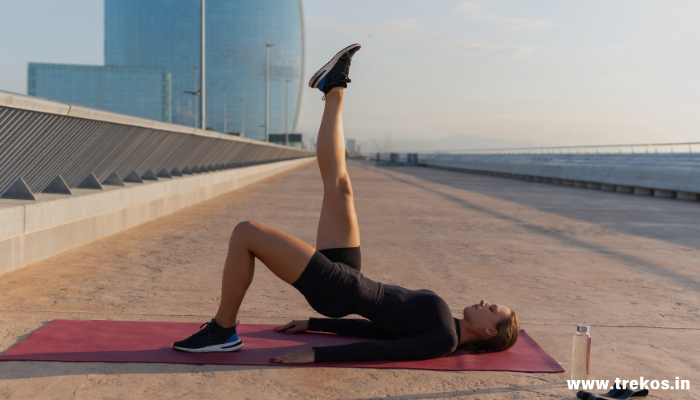
The legs indeed prove to be that potent force propelling a trekker on the daily trails, especially through those demanding ventures in Kashmir like the Kashmir Great Lake Trek. Sustained ascents through rocky tracks and many kilometre stretches can be readily handled with greater energy. Trekking involves engagement of all your quadriceps, hamstrings, calves, and glutes. Improving leg strength will keep you stable, minimize the potential of being injured, and conserve energy for hours of walking. This is why one should prepare for the Kashmir Great Lake Trek by adding exercises that would help in strengthening the legs, such as squats, lunges, and step-ups.
These exercises will build endurance and power to handle the varied terrain you’ll face. As importantly, leg strength needs to be developed, also building on right Fitness and Nutrition Tips for Kashmir Great Lake Trek. A diet balanced with protein will help your muscles repair and grow; while carbohydrates are an energy source each of us needs during long trekking days. Apart from this, hydration is equally important as it keeps the muscular system working perfectly during the trek. Leg strength will be enhanced through fitness and nutrition tips followed that would be explained in the Fitness and Nutrition Tips for Kashmir Great Lake Trek, thereby boosting stamina and tenacity in relation to trekking experience.
Core Strength
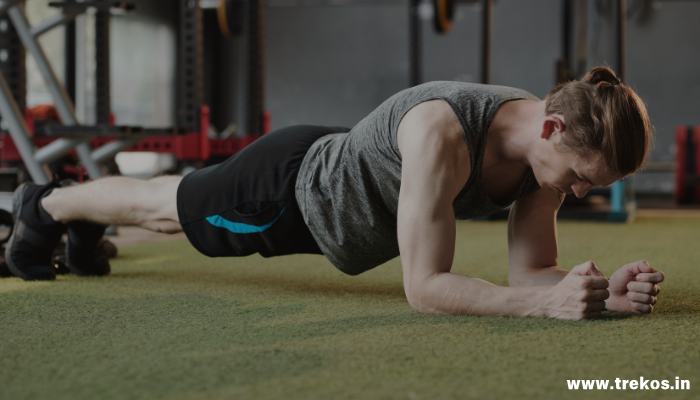
Core muscles are integral to trekking. The well-developed core will keep you stable and active while walking on uneven terrain, crossing roads, or holding onto your backpack while going on rocky paths. The lower back plus the famous abs and obliques provides the foundation for your entire torso, ensuring that you can stand straight and balanced even when trekking aggressively. Core strength helps protect against injuries since it reduces the impact of long treks on your body and strains in your back and legs.
The preparation to take on the Kashmir Great Lake trek would thus be a blend of core-building exercises like planks, crunches, and mountain climbers along with these tips on Fitness and Nutrition for Kashmir Great Lake Trek. Adequate nutrition, particularly the uptake of protein-rich foods and healthy fats, will energize your core muscles, whereas consumption of adequate water leads to endurance. In addition to physical conditioning, proper, balanced meal intake ensures recovery and also enhances muscle performance, as according to Fitness and Nutrition Tips for Kashmir Great Lake Trek.
Focus on the core strength, and follow the Fitness and Nutrition Tips for the Kashmir Great Lake Trek – the result will be prepared and equipped to handle the physical strain of the trek, which would make this journey less strenuous and more enjoyable.
Upper Body Stretching
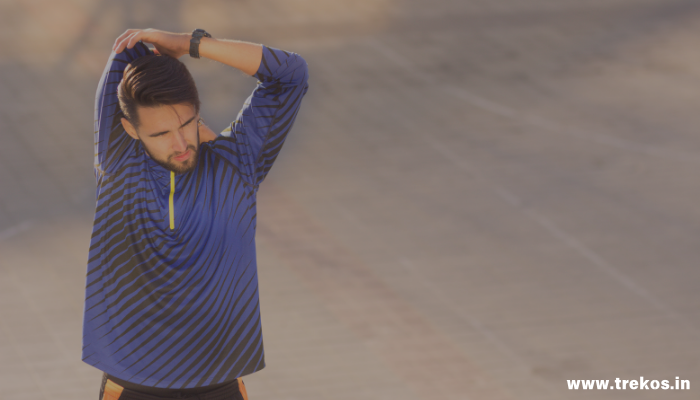
It’s also a great benefit of stretching the upper body for trekking, especially when it is a strenuous adventure-trekking journey, such as the Kashmir Great Lake Trek. People may focus entirely on the leg strength and endurance but forget that much of how to maintain their balance and posture and flexibility will come from their upper body with all those hours of carrying their backpack on uneven grounds.
Proper stretches of shoulders, arms, chest, and back reduce stiffness and prevent muscle fatigue so that one’s body can be in a position to support the load that one carries. Properly including upper body stretches like shoulder rolls, arm stretches, and chest openers will enable one to increase flexibility in better movement without straining or getting hurt.
This flexibility will be of utmost importance in the passage of rocky terrain and even steeper inclines which often form part of the Kashmir Great Lake Trek. To make your preparation even more effective, incorporating Fitness and Nutrition Tips for Kashmir Great Lake Trek in your training will maximize your performance.
Adequate nutrition, which includes foods rich in protein as well as antioxidants, helps in the well-facilitated muscle recovery, which in turn minimizes soreness after the long days on the trail. Stretching, combined with proper nutrition, helps to build endurance and prevent injuries, so following Fitness and Nutrition Tips for Kashmir Great Lake Trek will ensure that you are physically ready for the treks and will be able to better enjoy the trek without suffering injury or fatigue.
Flexibility and Stretching
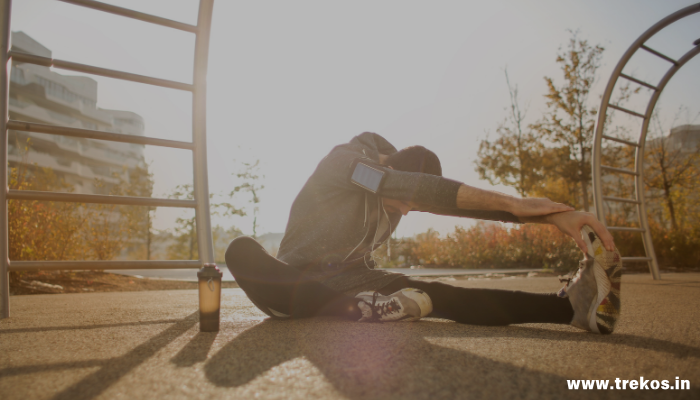
Great trekking experiences include flexibility and stretching, particularly in this moderately difficult route of the Kashmir Great Lake Trek. While most trekkers build up their strength and endurance, flexibility does equal amounts of work in preparing the body to Mold over bumping grounds, steep ascents, and challenging descents.
Stretches will help to avoid muscle straining, joints stiffening up, and injuries that are quite common before and after a trek, thus making your body more resilient throughout the hike. You will have flexibility training-the kinds of hamstring stretch, calf stretch, and hip opening-that will increase your range of motion and enable you to stride more with fluidity and avoid muscle strain.
The Great Lake Trek is such an adventure in Kashmir, where the context changes continuously. Flexibility can emerge as the difference between a smooth trek or an uncomfortable one. Such a flexibility routine combined with fitness and nutrition tips for Kashmir Great Lake Trek will further optimize your trekking experience.
A good nutritious diet that contains lean proteins, vitamins, and electrolytes keeps your muscles restored faster and stronger, thereby aiding the flexibility of your body. This also helps you keep your energy up throughout long treks during Fitness and Nutrition Tips for Kashmir Great Lake Trek. Both stretching and Fitness and Nutrition Tips for Kashmir Great Lake Trek must be incorporated in your training to conquer this trek efficiently.
Fitness and Nutrition Tips for Kashmir Great Lake Trek optimal Trekking performance

If you are preparing for a trek like the Kashmir Great Lake Trek, then you better be fit to succeed in the undertaking. One’s body has to keep up and carry one through the high altitude and challenging treks. Proper nutrition will ensure that your body performs at its best. Key Fitness and Nutrition Tips for Optimal Trekking Performance.
Pre Trek-Nutrition
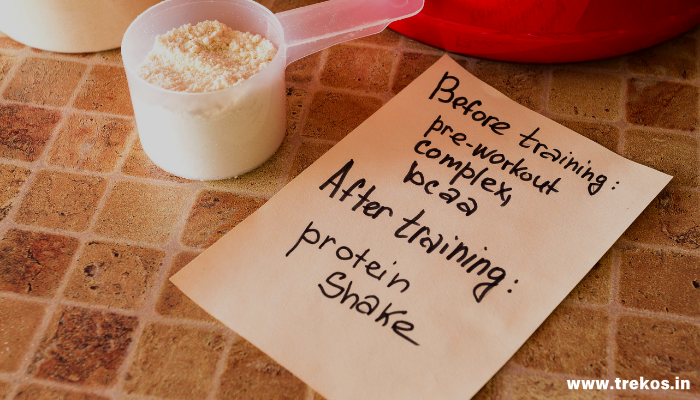
Before a trek, diet on balanced meals with good loads of complex carbohydrates, lean proteins, and healthy fats in order to build up energy stores. Keep hydrated and include iron-rich foods such as leafy greens for optimum levels of oxygen delivery, especially for high-altitude treks. Light and easily digestible meals the night before will ensure that you set off on the trek feeling energized without feeling heavy.
- Carbohydrate
As one of the most basic constituents of long-term energy, carbohydrates remain extremely important in the context of preparing for your Fitness and Nutrition Tips on the Kashmir Great Lake Trek. The complex carbs given by oats, brown rice, and whole grains all serve to significantly increase glycogen in your muscles, thus allowing for greater stamina in trekking. It would be advisable to begin to intensify carbohydrate consumption about a week prior to departing.
- Proteins
Building muscle also helps repair muscle tissue. Being an important element to bear the high-altitude challenges of the trek, proteins are very helpful in repairing the muscles and building up strength. In your fitness and nutrition tips for the trek, include lean meats, eggs, legumes, and nuts. When taken in greater amounts for weeks before the trek, it helps manage the physical rigor that comes with the treks and fasten recovery from exhausting days.
- Healthy fats:
Healthy fats help ensure long-term energy supplies, which is crucial for a trek like Kashmir Great Lakes. Incorporate fitness and nutrition tips for the Kashmir Great Lake trek by including healthy fats-rich foods like avocados, nuts, seeds, and olive oil, which will increase stamina and maintain the stores to provide energy. These will fuel your body over time in trying sections of the trek.
- Hydration
Hydration is the most important thing during any trek. Drink lots of water three days before the trek as your fitness and nutrition tips for the Kashmir Great Lake trek. Hydration keeps away fatigue, altitude sickness, and even cramps – all critical to having a successful and pain-free trekking experience.
On Trek Nutrition
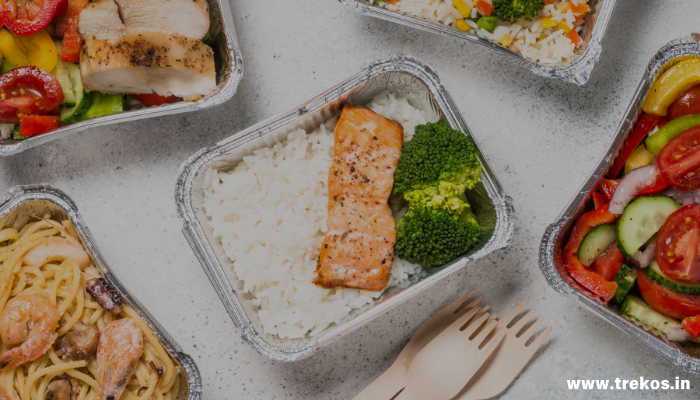
One essential requirement for this trek would be energy and stamina during the walk. In Fitness and Nutrition Tips for Kashmir Great Lake Trek, nutrient-rich snack intake like nuts, dried fruits, and energy bars should be maintained in order to maintain energy throughout the day. Apart from that, staying hydrated as well as having well-balanced meals at rest stops along with carbohydrates and proteins will help maintain endurance and recover muscles on the trails.
- Snack for Energy:
Snacks are a must to provide instant energy boosts in long treks. Carry lots of energy-boosting snacks, such as trail mix, dried fruits, and granola bars, as recommended in Fitness and Nutrition Tips for Kashmir Great Lake Trek. Such snacks contain quick-digesting carbohydrates and healthy fats to keep your energy level intact throughout the day at any physically stressing segment of the trek.
- Hydration
Hydration will also be important not to fall victim to altitude sickness and retain energy. For the Fitness and Nutrition Tips for Kashmir Great Lake Trek, it will turn into a habit to drink water constantly during the trek to avoid dehydration and muscle cramps. Introducing electrolyte drinks or coconut water to replenish minerals lost by sweating in order that levels remain steady during the hike.
- High carbohydrate Meals
High-carb diets provide you with enough fuel to sustain endurance while on tough trekking excursions. In Fitness and Nutrition Tips for Kashmir Great Lake Trek, accentuate carb-rich foods like pasta, rice, and quinoa that keep energy stored as glycogen. Such meals will give you sustainable energy, keeping you energetic, preventing fatigue during long hiked days.
- Protein Intake
Protein intake will provide muscle repair and energy required for challenging treks. Add eggs, lean meats, tofu, and legumes to your list of Fitness and Nutrition Tips for Kashmir Great Lake Trek in order to provide adequate protein that aids in the development of recovery in muscles and strength. This will give your body a much-needed protein uptake to handle daily physical demands and reduce soreness that will see you withstand each day on the trail.
Acclimatization: An Important Aspect of Fitness

For a safe and an enjoyable high-altitude trek, acclimatization is necessary. Remember, though you might be spending time at a higher altitude before climbing the further altitude, it reduces chances of altitude sickness on your body due to it being accustomed to less levels of oxygen. Proper acclimatization along with hydration and nutrition supports better endurance and makes trek much more comfortable.
- Gradual Altitude Gain
Gradual altitude gain will help in managing altitude stress and safety on high-altitude treks. In this case, slow and steady is the key giving time to the body to cope with it, thus keeping the chances of altitude sickness at bay. Pacing your climb will help improve oxygen uptake and ensure your energy and comfort are sustainable throughout the trek.
- Hydration and Nutrition
Hydration and nutrition are the two basic requirements for endurance and stamina while on long treks. In Fitness and Nutrition Tips for Kashmir Great Lake Trek, it is fundamental to declare constant drinking of water and diet containing carbohydrates, proteins, and healthy fats to keep up the energy levels. Hydration and nutrient supply go hand in hand to counter fatigue, enable the muscles to recover, and help boost endurance to make the trek safer and enjoyable.
Recovery and Post Trek Fitness
Recovery would be crucial for post-trek fitness and muscle repair. Fitness and Nutrition Tips for Kashmir Great Lake Trek teaches you gentle stretching, hydration, and protein intake so that your muscles recover from soreness and maintain the strength developed in trekking.
- Rest and Rehydrate
Rest and rehydrate to aid in recovery and energy on challenging treks. In Fitness and Nutrition Tips for Kashmir Great Lake Trek, regular breaks to rest and drink water will keep your body strong as it adapts to high altitudes. Rehydrating often will replace all lost fluids, repair muscles, and prepare you for each day’s trekking demands.
- Protein for Recovery
After the tough trek, protein is what is required for replenishment. Incorporate nuts, eggs, or yogurt in your Fitness and Nutrition Tips for Kashmir Great Lake Trek that contains a lot of protein for rebuilding muscles and reduction in soreness to be prepared for the hike on the next day.
- Stretch And Walk
Simple stretches and walks are important in warming up muscles and enhancing flexibility. In Fitness and Nutrition Tips for Kashmir Great Lake Trek, a gentle stretch and walk every morning prepares the body to reduce stiffness, thus preventing injuries on the trail.
Importance of sleep and Mental fitness
Good quality sleep plays a great role in the physical recovery and mental clarity in demanding treks. Good quality sleep will rejuvenate your body, help you increase your endurance, and concentrate well on the trail. Adequate rest will reduce stress, elevate your mood, and mentally prepare you for what is ahead, so your trekking journey will become enjoyable and successful.
Fitness and Nutrition Tips for Vegan or Vegetarian Trekkers
One such way is through plant-based options that are rich in protein as well as complex carbs. That would give strength and stamina for vegan and vegetarian trekkers. Include foods like lentils, chickpeas, quinoa, nuts, and seeds to fuel the muscles and aid their recovery. And thereby must ensure completing nutrition for sustained energy as well as healthy muscles during trek.
- Plant Based Proteins
Plant-based proteins are essentials for the vegan and vegetarian trekkers, and the power and endurance required to power up and push through an adventure. In Fitness and Nutrition Tips for Kashmir Great Lake Trek, don’t forget the lentils, beans, chickpeas, or quinoa so as not to neglect the reconstitution of your muscles yet keep you powered throughout these challenging days of the trek.
- Nuts and Seeds
Nuts and seeds are dense nutritious foods excellent for enhancing energy and endurance on treks. For Fitness and Nutrition Tips for Kashmir Great Lake Trek, some options include almonds, walnuts, chia seeds, and pumpkin seeds, all rich in healthy fats, proteins, and fibres that will sustain the energy level. They also have minerals like magnesium and potassium, which prevent muscle cramping and support recovery at the trail end.
Conclusion
The fitness and nutrition tips for Kashmir Great Lake Trek, how they encourage you to prepare in advance: balanced diet, hydration, gradual acclimatization, and altitude gain to make sure a safe and successful trek. Incorporation of complex carbs, proteins, healthy fats, and nutrient-dense snacks ensures that you remain energetic and recover better day after day. Rest well, hydrate, and mentally prepare for trek demands. With these strategies, the trekker can sustain themselves and also enjoy the journey through the fantastic beauty of Kashmir Great Lakes.
FAQ
1What are Some of the most important tips in preparation for high altitude trekking include the following
they should be doing their cardio exercises regularly, which can either be hiking, running, or even simple jogging; some strength trainings on their legs and on their core muscles; adequate energy-sustaining carbs, proteins, and healthy fats.
2. Which Of the following snacks that will offer energy, according to Fitness and Nutrition Tips for Kashmir Great Lake Trek?
According to the Fitness and Nutrition Tips for Kashmir Great Lake Trek, suggested snack items include nuts, seeds, dried fruits, and granola bars. These provide quick energy, healthy fats, and minerals that help keep going on a trek.
-
In which ways will Fitness and Nutrition Tips for Kashmir Great Lake Trek help me when I am in altitudes?
Fitness and Nutrition Tips for Kashmir Great Lake Trek will help when one is kept abreast with gradual gain in altitude and rest along with hydration as required so that acclimatization to lower oxygen levels can occur without the influence of the impact of altitude sickness if rested and paced well.
- What high protein food should a vegetarian take, according to the heads of suggestions of Fitness and Nutrition Tips for Kashmir Great Lake Trek?
Protein sources through vegetarian diets, as the heads of suggestions of Fitness and Nutrition Tips for Kashmir Great Lake Trek advise, are lentils, chickpeas, tofu, and quinoa, amongst others. All these help in recovering muscles along with strength during trekking.
- Why Hydration? How much am I supposed to take while in Fitness and Nutrition Tips for Kashmir Great Lake Trek?
Hydration is a must, during the Fitness and Nutrition Tips for Kashmir Great Lake Trek as it would avoid one from altitude sickness, cramps, and fatigue. To keep proper hydration, at regular times of the day, even if you’re not thirsty, try taking small quantities.

